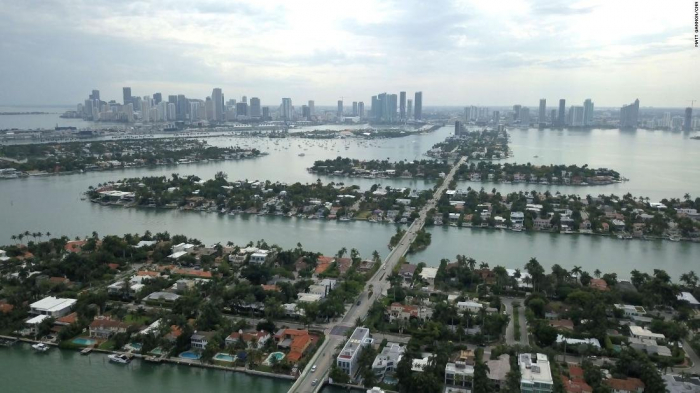A new study, published Tuesday in the journal Nature Communications, found that as the climate crisis intensifies, sea levels globally are expected to rise between two to seven feet (0.6 meters to 2.1 meters) -- and possibly more -- over the course of the 21st century.
The findings are based on new artificial intelligence and data, nearly tripling the previously estimated area and populations under threat.
By 2050, land that is currently home to about 300 million people will fall below the elevation of the average annual coastal flood -- meaning they could face severe floods at least once a year. By 2100, land that is home to 200 million people could sit permanently below the high tide line, rendering those coastal areas all but unlivable.
"The results indicate that, yes, a great deal more people are on vulnerable land than we thought," said Benjamin Strauss, one of the study's co-authors and CEO of non-profit organization Climate Central. He added that these affected regions need to take immediate action to avoid the impending "economic and humanitarian catastrophe."
Entire coastal cities could be wiped out if there aren't enough sea defenses in place. Some 70% of the people at risk of yearly floods and permanent inundation are in eight Asian countries: China, Bangladesh, India, Vietnam, Indonesia, Thailand, the Philippines, and Japan, according to the study.
China's low-lying big cities are particularly vulnerable, according to a Climate Central press release -- think Shanghai, Tianjin, and Hong Kong. Other Asian cities at risk include Vietnamese capital Hanoi, Bangladeshi capital Dhaka, and the eastern Indian city Kolkata.
The entire southern tip of Vietnam could be flooded, according to Climate Central's projections.
It's not just Asia, either -- according to Climate Central, 19 other countries, including Brazil and the UK, could see land falling permanently below the high tide line by 2100.
"If our findings stand, coastal communities worldwide must prepare themselves for much more difficult futures than may be currently anticipated," the study warned. "Recent work has suggested that, even in the US, sea-level rise this century may induce large-scale migration away from unprotected coastlines, redistributing population density across the country and putting great pressure on inland areas."
The climate emergency has seen glaciers and ice sheets rapidly melting, from the Himalayas to Antarctica. Previous reports had predicted that sea levels could rise by three feet (0.9 meters) -- which Climate Central researchers now say was too conservative an estimate.
"We've already shifted from a world in which sea level was stable to one in which it is rising, and it will continue to rise for decades, and in fact, hundreds of years," Strauss told CNN.
Of the major ice sheets, Greenland's is melting the fastest, and lost more than 275 gigatons on average per year between 2006 and 2015, according to a landmark report last month by the United Nations' Intergovernmental Panel on Climate Change (IPCC). But the even larger Antarctic ice sheet is also shrinking, and its mass loss tripled between 2007 and 2016 compared to the previous 10 years.
These rising oceans spell disaster for coastal residents who could be forcibly displaced. Entire Pacific islands could be submerged, creating waves of climate refugees who might not have anywhere to go. They are not protected by international laws, so industrialized countries aren't legally obligated to grant them asylum.
Rising sea levels contribute to warmer global temperatures, changing what kinds of crops farmers can grow -- meaning millions of people could face food and drinking water scarcity, health crises, and a disrupted global economy.
CNN
















































